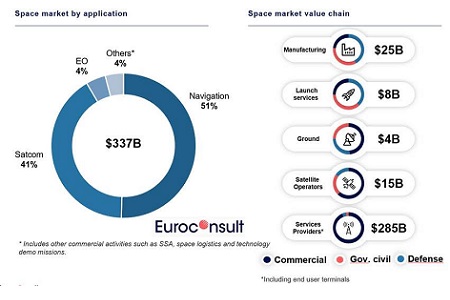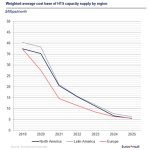According to the report, by 2030, the space economy is expected to grow by 74% to reach $642bn.
 The global space economy has totalled $370bn over 2021, including both private and public expenditure in the industry, according to Euroconsult’s annual Space Economy report.
The global space economy has totalled $370bn over 2021, including both private and public expenditure in the industry, according to Euroconsult’s annual Space Economy report.
The space economy is expected to grow by 74% by 2030 to reach $642bn (6.3% CAGR) renewing its strong growth pattern following a 4% decrease in 2020 under the effect of the covid crisis impact on commercial space services.
The global space market is valued at $337bn in 2021 up 6% vs 2020, i.e., a market value comparable to 2019 prior to the covid crisis which impacted satellite service revenues in 2020. The largest revenue drivers remain satellite navigation and communications which account for 50% and 41% of the total market value respectively, driven by B2C applications. In comparison, EO still accounts for a marginal 5% of the total value but with a much higher proportion upstream. Satnav has surpassed satcom, growing from about 37% of the total revenues in 2016 to over 50% in 2021, largely due to services enabled by GNSS services and their related devices.
Of the space market value chain, service providers generated $285bn, while manufacturers and satellite operators generated $25bn and $15bn respectively.
The Space Economy Report 2021 covers the entire space value chain, with key facts and figures and concise analysis of upstream satellite manufacturing and launch services, as well as downstream satellite operations and satellite services.
















































































